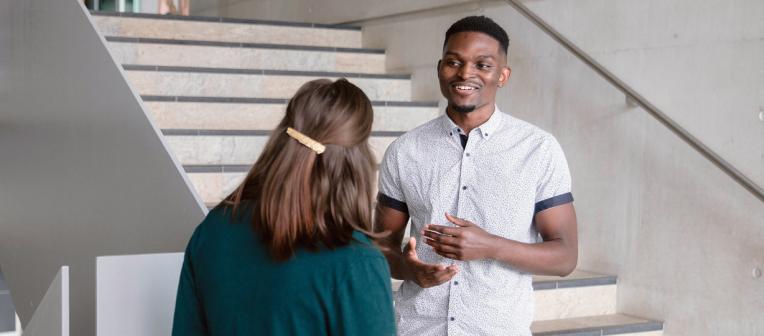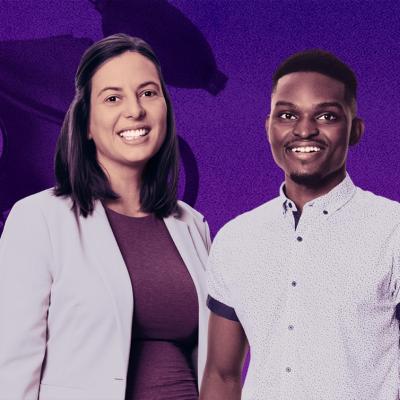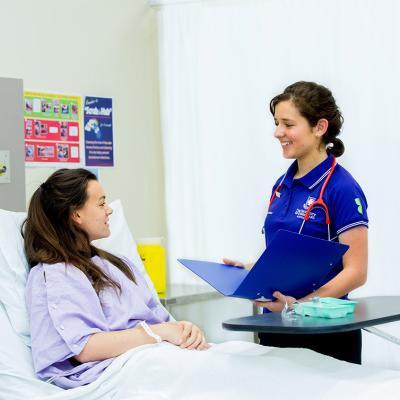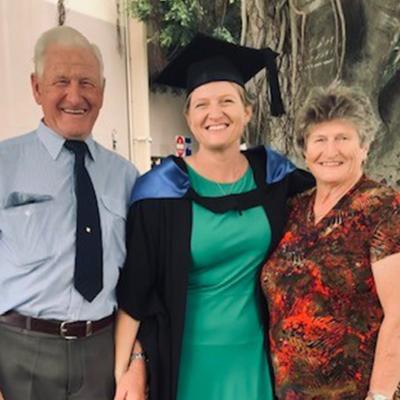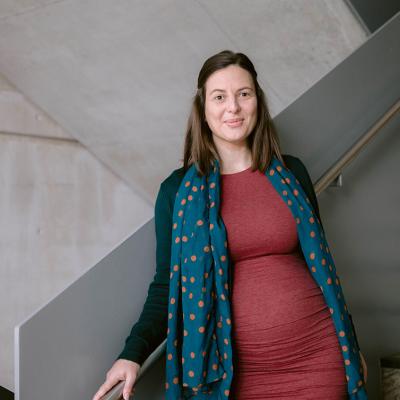Considering studying nursing at university? You may have lots of questions. We're here to help you find answers.
- What do you learn while studying a nursing degree?
- What does a day in the life of a nursing student look like?
- What kind of job can you get with a nursing degree?
- Why study nursing?
- How hard is it to study nursing?
We've interviewed a UQ student and academic to find out. Leon is a Bachelor of Nursing student, and Dr Amanda Cottle-Quinn is a lecturer at the School of Nursing, Midwifery and Social Work. They’ve teamed up to answer some of your questions and uncover how UQ can give you the skills you need to face the future, even when you don't know exactly what the future will look like.
Let's find out if nursing sounds like the study area for you.
What are some of the coolest jobs your former students are doing?
Amanda: Some of my students work for the Royal Flying Doctor Service. I think that's a cool job that they really enjoy and they've gone on to do midwifery as well. I have other students that now help me with teaching and tutoring. I love getting to watch them start off as a first year and then come back and get to teach students what they have learned along the way.
There's lots of people who have amazing jobs in big hospitals, but there are also lots of people who are doing really cool stuff a little left field like cosmetics, research and in primary healthcare. I like hearing back from students who are doing things that are new.
What has been the most unexpected thing you have been happy to discover at UQ?
Leon: I discovered that I love learning, but studying can be challenging. I’ve had to get myself more disciplined and create a study schedule and stick to it.
Something that I was really happy to discover was that we have opportunities to do an international placement. I went to India for a month and a bit in my second year to complete a nursing placement. Initially it was scary, but it was one of the best experiences of my life. We got to experience how a different healthcare system works, and see some of the things that people in different countries have to go through to get what they need done.
Find out more about Leon's experience on placement in India.
What opportunities do students have to get hands on experience in our industry?
Amanda: In the Bachelor of Nursing, one of the things that sets UQ apart is that you start your placements in your first year. So you're going into the hospital, you're applying the knowledge that you've learned and you're truly getting to see what it is like to do that job.
I think it is really important to have that early introduction as it allows you to really explore and understand what the job is 100% so you don't waste any time.
Leon: For me, the initial placement was a bit nerve wracking. I had amazing clinical supervisors, they would come in, check on us and ask how we were going. I knew this was what I really wanted to do.
What have you learned about yourself since you began your studies at UQ?
Leon: Initially I wasn't sure what side of nursing I wanted to do. I just knew I wanted to do nursing. I have learned that I want to learn a lot more about nursing and eventually do my master's in nursing. I want to do more for my community and this is just the beginning.
Amanda: That makes me so excited! For me as an academic, I want every nurse that I start to teach in an undergrad bachelor to think about this as the first step in their career. This is not something where you just do this bachelor so you can get this job, so you can do that for the rest of your life. This is step one, and then you could go into your masters, and even go do some research, and you could do your PhD.
How do you prepare students for the future when we don't know what the future looks like?
Amanda: The important thing to understand is that healthcare is always evolving and the kind of things that we need to focus on as health professionals is always changing and adapting. The biggest things that you need to be able to do, and the things that it's my job to teach you, is to learn how to be resilient and develop the skills to come across a problem and not see it as an obstacle, but to see it as a way to grow and to find a way to be creative. But that's what I think. What do you think?
Leon: I agree, having the ability to bounce back from challenges is important. Know that whatever obstacle you do have at the moment, it won't last forever.
Amanda: It’s important to remember that you're never alone. You’re never going to be standing in the middle of a hospital or any clinical environment with no one else around – you will always have support because in health care you always work in a team. You never have to feel like this is solely on your shoulders and this is solely your responsibility and you're by yourself, because we're all in it together.
What do you think employers in your industry are looking for and how do you think UQ has equipped you with these skills?
Leon: I think employers want graduates who are able to reason clinically, put patient safety first, and who are passionate and able to be leaders in practice. I feel UQ has prepared me very well for that.
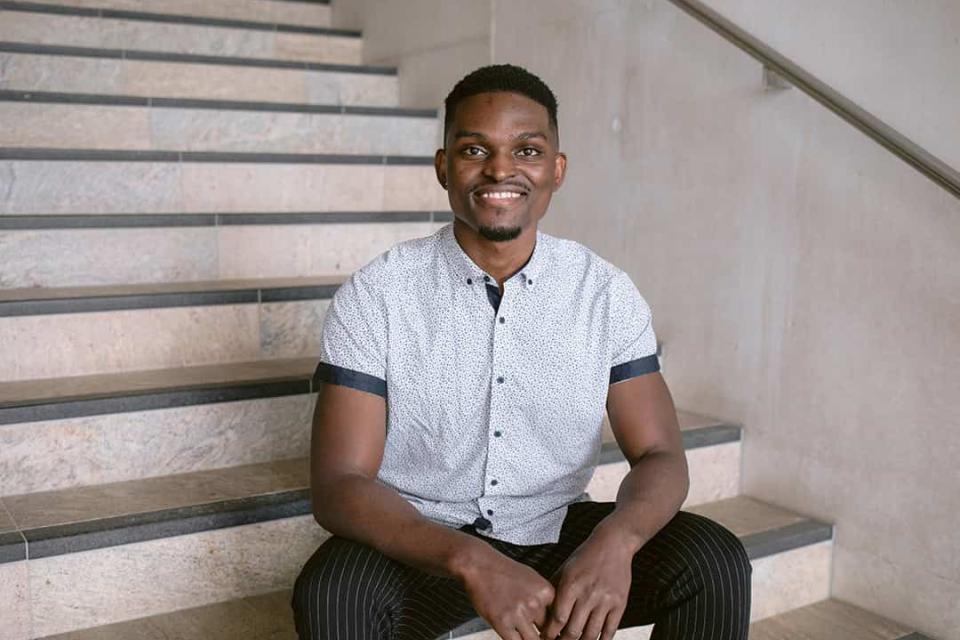
What makes a good student and are they the same things that make a good job candidate?
Amanda: Someone who has a desire to learn, but understands that studying is hard. Having that passion is paramount. You have to be ready and willing to adapt, to grow and to understand that not everything is going to go your way. That is what makes a good student – someone who has the time and the passion to want to learn the step by step, and step back and see the bigger picture as well. I think that they are the same things that employers want.
Anyone can learn a skill, anyone can learn how to put in a catheter, but you can't teach someone how to be good at receiving feedback, you can't teach someone how to be good in a team environment. You can develop these skills, but if they're not willing and open to those types of learnings, then they're not going to do well in their degree and then they're not going to do well with their employers. Another thing that makes a really good student is a good support network. If you have a good support network, it's much easier to succeed.
Leon: I feel like UQ does have a great support network. Whenever I had a problem I could just quickly email my course coordinator and they'd be like, ‘here you go – this is what you need to do’, or if you're struggling you could just go to one of the lecturers and talk to them.
Amanda: We have student services as well and we also have such a vibrant student community. There are so many clubs and societies.
Leon: Yeah, I joined the photography society. We went on field trips to take photos and got together to do barbecues. It was a lot of fun.
What are the most valuable skills you've learned as part of your degree?
Leon: Leadership is one of the top skills I've learned. Also to be creative and compassionate. Empathy as well – empathy for everybody else and yourself.
If you could give me one piece of advice that will set me apart as a job candidate, what would it be?
Amanda: So this advice would go for all graduates, not just for nurses. When you finish your degree and you're sitting in your graduation watching everybody else pick up that piece of paper, have a think. What do you have that nobody else has? What are the special things that make you, you, and make you the highest-quality candidate for the place you want to work? Then you need to be able to market that, you need to be able to say ‘this is what I offer and no one else has it’, everyone else has that piece of paper, but I’ve got this, and no one else has got this. What sets you apart?
What does a day in the life of a health and behavioural sciences student look like?
Leon: You wake up, of course, and I feel it's always important to do some exercise. Exercise is so important for your mental health and physical wellbeing. Of course showing up to the lectures, and then after the lecture I’ll study and work on any assessment. I also enjoy hanging out with friends, going to lunch and then attending another lecture. I’ll generally have two lectures in one day. On other days of the week I might have placement. Sometimes I would have placement twice a week.
Amanda: That's the other difference at UQ, we have the integrated placement and so one day you might be coming onto campus having lectures and integrated learning in tutorials or your clinical skills and then other days you go to placement and you do an eight hour shift.
Explore the Bachelor of Nursing or discover what it's really like to study other programs at UQ.

